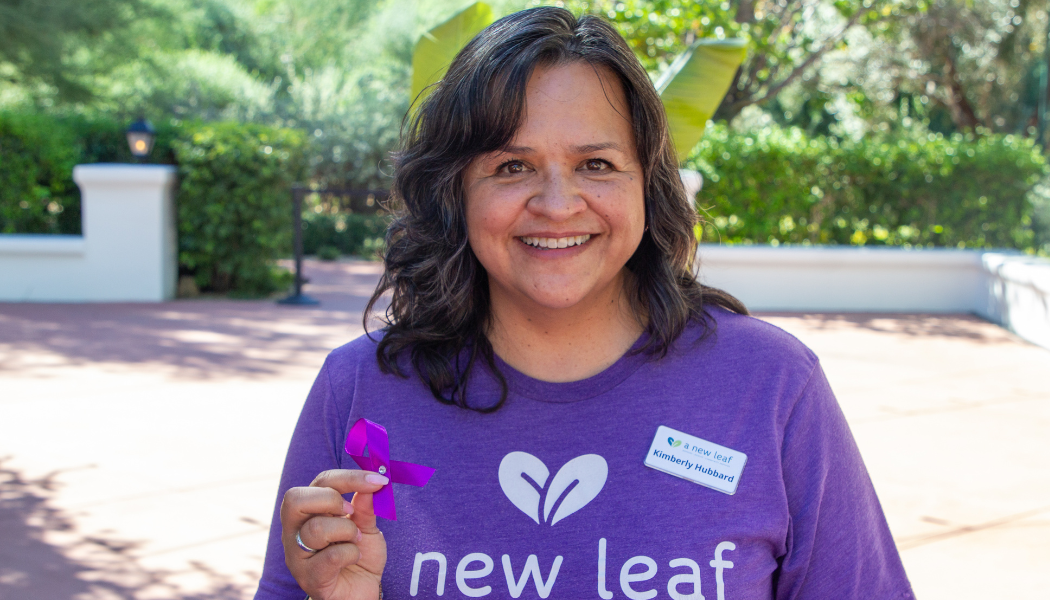October is Domestic Violence Awareness Month
If you or someone you know is currently experiencing abuse or violence of any kind, please call the Maricopa County Domestic Violence Hotline (480) 890-3039 or 1-844-SAFEDVS for assistance.
October is Domestic Violence Awareness Month. Thanks to people like you, A New Leaf is able to provide life-saving services to survivors of domestic violence, helping them to heal and find safety. In the past year alone A New Leaf has served thousands of survivors thanks to your support.
survivors rescued from danger
meals served to survivors in need
nights of safe shelter provided to survivors
A New Leaf recognizes the widespread and urgent need to address rising domestic violence rates across the Valley by making services as easy to access as possible.
What is Domestic Violence?

Domestic violence is a pattern of behavior used by one person to gain power and control over another within a relationship. It can take many forms, including physical harm, emotional manipulation, sexual abuse, financial control, and verbal threats. The abusive behavior often escalates over time, creating a cycle of control and fear for the person on the receiving end. Domestic violence can occur in any type of relationship, regardless of age, gender, or background.
It is important to recognize that domestic violence is not limited to physical harm. Emotional abuse, such as belittling or constant criticism, can leave deep scars, and financial abuse, where one partner restricts access to money or employment, can create further dependency. We believe in raising awareness, breaking the cycle of abuse, and empowering individuals with the resources and support they need to reclaim control of their lives.
Domestic Violence Awareness Month is an opportunity for communities to come together, raise awareness, and take action to prevent further abuse and support survivors in need. It’s a time to educate, advocate, and provide resources to those in need, reaffirming our commitment to ending domestic violence and building safe, supportive environments for everyone.
What are the Warning Signs of a Domestic Violence Situation?

Recognizing the warning signs of domestic violence can be the first step in offering help to someone in need. Domestic violence doesn’t always begin with physical abuse; it often starts with subtle forms of control and manipulation that escalate over time. Here are some of the key warning signs to look out for:
-
Controlling Behavior: One partner may start to control the other’s actions, dictating where they go, who they see, and even what they wear. They might monitor phone calls, text messages, and social media accounts to track the other person’s activities.
-
Isolation: Abusers often attempt to isolate their partner from friends, family, and social networks. They may discourage or forbid the person from spending time with loved ones or participating in activities outside the home.
-
Extreme Jealousy: Excessive jealousy, accusations of infidelity, and possessive behavior are often early signs of abuse. The abuser may become angry or suspicious whenever their partner talks to others or spends time outside the relationship.
- Verbal and Emotional Abuse: Name-calling, belittling, and constant criticism are forms of emotional abuse that can erode a person’s self-esteem. The abuser may humiliate or intimidate their partner, making them feel worthless or incapable of making decisions on their own.
-
Physical Aggression: Even if physical violence hasn’t occurred yet, threats of harm or aggressive behaviors—such as throwing objects, punching walls, or physically restraining someone—are clear warning signs that the situation could escalate.
-
Financial Control: In cases of financial abuse, one partner controls all the finances, restricting the other’s access to money. This can make it difficult for the survivor to leave the relationship due to a lack of financial resources or independence.
-
Blaming and Guilt-Tripping: The abuser often blames their partner for the abuse, claiming that their actions are a response to the partner’s behavior. They may use guilt-tripping tactics to manipulate their partner into staying in the relationship.
-
Unpredictable Mood Swings: Abusers may exhibit extreme mood swings, going from loving and apologetic one moment to angry and violent the next. This unpredictability can keep the victim off balance, feeling unsure of how to act or respond.
-
Threats and Intimidation: An abuser may threaten to harm the person, their loved ones, or even themselves if the victim tries to leave the relationship. This creates a fear-based dynamic that can trap someone in an abusive situation.
-
Destruction of Property: Breaking items, destroying personal belongings, or vandalizing a shared space can be an intimidation tactic used by abusers to instill fear and assert dominance.
You can visit https://www.thehotline.org/identify-abuse/domestic-abuse-warning-signs/ to learn more about the warning signs of domestic violence.
How Can You Help Survivors in Need?

During Domestic Violence Awareness Month, members of the community just like you play a critical role in supporting survivors and raising awareness about domestic violence. Here are several ways you can make a meaningful impact this month:
- Raise Awareness: Share information about domestic violence on social media, through conversations with friends and family, or by participating in community events. The more people understand the complexities of domestic violence, the better we can work together to prevent it. You can also wear purple—the color representing Domestic Violence Awareness Month—and post on social media to spread even more awareness.
- Donate to Local Shelters and Organizations: Support organizations that provide critical services for individuals escaping domestic violence. Your donation can help fund emergency shelters, counseling services, legal aid, and more. Donations of clothing, household items, and hygiene products can also make a significant difference in the lives of survivors looking to rebuild their life after experiencing abuse.
- Volunteer Your Time: Many shelters and nonprofits rely on volunteers to provide services such as childcare, administrative support, and organizing donations. Volunteering can make a direct and immediate impact in the lives of survivors and the functioning of these vital organizations.
- Educate Yourself and Others: Take time to learn more about domestic violence and its warning signs. Participate in workshops, webinars, or community discussions. By educating yourself, you can become a more informed advocate and offer better support to those who may be experiencing abuse.
- Offer Support to Survivors: If you know someone who might be in an abusive situation, offer a listening ear and let them know you’re there to help without judgment. Provide them with information about local resources, such as hotlines and shelters, but be mindful of their safety when doing so.
Faces of Survivors

Adrianna's Family Found A Home
Adrianna and her daughter were stuck in an abusive household for over a year. After she made the decision to leave, Adrianna and her daughter had to live out of their car during the blistering Arizona summer. She used the domestic violence helpline to find safety and stability for her family. You can read more about Adrianna’s story by clicking the button below.

Yvonne and Her Son Are Safe
Yvonne is a single mother with a newborn son. She had endured years of physical and mental abuse while with her husband, and knew that she had to make a change. Yvonne reached out and was able to secure safe shelter, food, and stability at A New Leaf’s Autumn House domestic violence shelter. You can read her story by clicking the button below.
